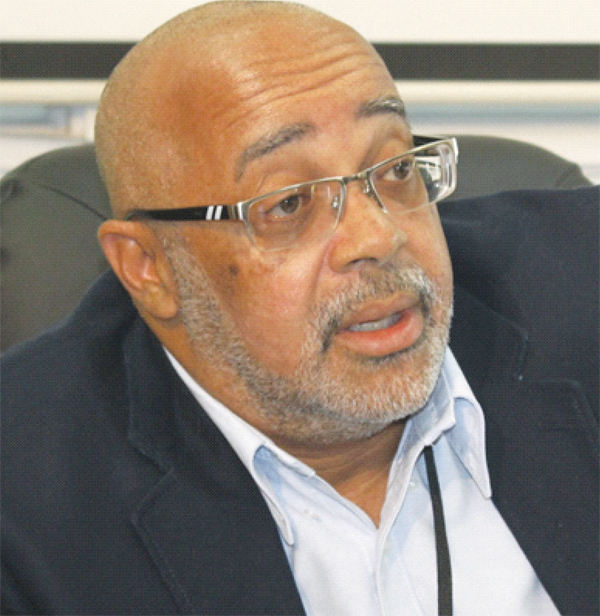Guadeloupe Plans To Join As Well

DIRECTOR-GENERAL of the Organization of Eastern Caribbean States (OECS), Dr. Didacus Jules, has described the recent 60th Meeting of the Authority in Martinique “a very successful meeting” for several reasons.
Dr. Jules said that Martiniquans seemed “excited” at becoming an OECS Associate Member following that nation’s accession to associate membership on February 4.
Apart from the formal signing of documents by President of the Regional Council of Martinique, Serge Letchimy, to initiate Martinique’s accession to OECS membership, Dr. Jules said Heads of Government also discussed several crucial issues during the February 4-5 meeting, including:
(1) advancement of the OECS Economic Union,
(2) options for sustainable financing of the OECS,
(3) a proposal for the establishment of the Eastern Caribbean Competition Commission (ECCC),
(4) an OECS “carve out” in the Revised Treaty of Chaguaramas (essentially keeping its commitment to CARICOM’s integration process while proceeding at a faster pace in getting things done,
(5) a commitment to a transparent rules-based international trading system,
(6) the need for strengthening the equal application of standards across the board and to all countries and territories to ensure a level competitive playing field,
(7) an update on the free circulation of goods in the OECS Economic Union,
(8) a mandate adopted that a board meeting of the Eastern Caribbean Civil Aviation Authority (ECCAA) be held as soon as possible, and
(9) a discussion of the areas for cooperation and partnership between Martinique and her other OECS members.
Strengthening regional security, cost-effective approaches in operating the OECS Commission and greater harmonization among the Member States were also main points discussed at last week’s meeting, Dr. Jules said, adding that President Letchimy suggested greater youth participation in that process.
“(President Letchimy) issued a very strong call for engagement of youth in the regional integration process and suggested that we look at exchange programmes within the education systems of the countries,” Dr. Jules said. “(This means) that young people can do short sabbaticals and exchanges, home stays in each other’s countries to better understand the systems, geographies and environments of our respective states. So we are going to move speedily on that.”
Two other crucial areas of collaboration between the French-speaking island and the rest of the sub-region are (1) the hosting of an upcoming high-level summit for Heads of Government on interconnectivity and transportation and infrastructure aimed at improving air and sea transport and (2) harmonizing the sub-region’s positions on global climate change in preparation for the major global conference on climate change slated for December in Paris.
Dr. Jules said President Letchimy is expected to “champion the cause of small island states (SIDs) at the climate change level” at that conference.
“Here we’re going to be moving to secure financing to help build resilience against climate change, protection against the kinds of damages we’ve seen happening with troughs and other high impact events,” Dr. Jules explained. “So President Letchimy (will be) organizing a conference in Martinique to bring the Heads of State together prior to the final conference in Paris so as to converge positions.”
Dr. Jules said that preparations in that regard have begun with the French Ambassador to the OECS already working with the Commission to establish a working group that will at the technical level collate the arguments to present the OECS’s case at the December conference.
While Martinique’s entrance into the OECS fray might be relatively new, Dr. Jules said efforts are being made to proceed diligently and speedily to ensure that the current momentum and fervour are not lost. He said the OECS Commission hopes that Martinique’s membership would result in protocols designed to make travel among the Member States “easier and more comfortable.”
“The ease of doing business between Martinique and the OECS would be enhanced. But it will not be the type of freedom of movement that you see within the rest of the OECS because entry into Martinique is also automatically entry into Europe and France,” Dr. Jules said.
Dr. Jules noted that while Martiniquan businesses have already shown interest in investing in the rest of the OECS, the ease of doing business in the sub-region needs to be addressed so as to facilitate such ventures. He cited the upcoming interconnectivity conference as being the platform to discuss “the infrastructure of transportation by sea and air in order to make commerce happen faster and easier.”
Meanwhile, a delegation from Guadeloupe visited Saint Lucia last week and has started formal relations for accession to OECS membership. Dr. Jules said that while Guadeloupe had been adopting “a very diligent approach” towards OECS membership, “they were doing research, looking at opportunities and so on.” They now seem ready to fast-track negotiations.
“The formal thing means that we’re now on an accelerated path. So hopefully it should be a matter of months before we can close (negotiations). But the difference with Guadeloupe is that when we close negotiations, it’s not going to be just an agreement to join. They want to close with a comprehensive programme of collaboration agreed to,” Dr. Jules explained.






![Attendees at the UHC logo and website launch [Photo credit: GOSL]](https://thevoiceslu.com/wp-content/uploads/2026/02/Attendees-at-the-UHC-logo-and-website-launch-380x250.jpg)






![Remnants of an alleged drug boat blown up in a lethal strike by the U.S. military last week surfaced off Canouan on Saturday [Photo credit : St Vincent Times]](https://thevoiceslu.com/wp-content/uploads/2026/02/Remnants-of-an-alleged-drug-boat-blown-up-380x250.jpg)
